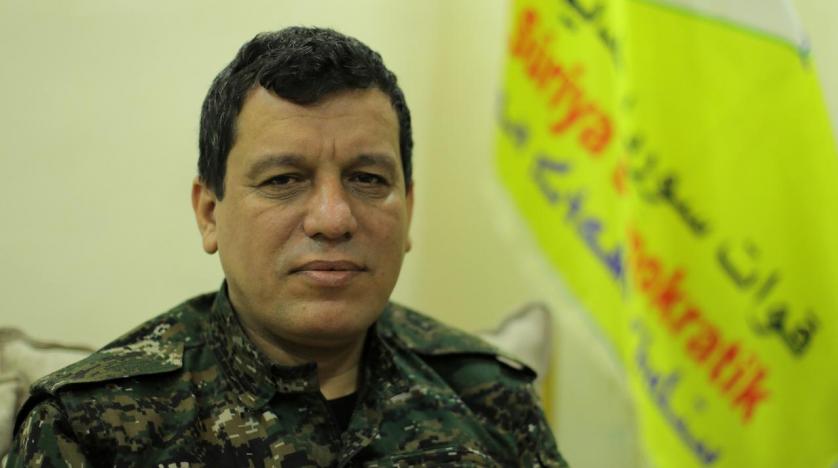Kurdish military leader and commander of the Syrian Democratic Forces (SDF) Mazloum Abdi, in a phone call interview with Asharq Al-Awsat, revealed that US troops have been deployed to new positions in Syria’s east of the Euphrates region.
The deployment, according to Abdi, followed US presidential orders to combat ISIS and protect local oilfields there.
More so, Abdi voiced his reassurance that US troops will defend SDF units against any attack, but noted that the situation in the east Euphrates region is “far more complicated than before.” The scene has been muddied by the presence of Russian, Turkish, Syrian and international troops in the area.
When asked about whether the disappointment felt from the former US decision to withdraw troops from Syria persisted, Abdi replied: “Of course, the sudden American withdrawal created disappointment and distrust in previously made (American) promises.”
“We know that reversing the decision to withdraw was the result of pressure from the American public, Congress, other parties and other friends in the International Coalition forces against ISIS. This made us feel optimistic about having friends.”
“In America, there are those who want to withdraw and there are those who want to stay until peace is achieved in Syria.”
On the other hand, the SDF commander expressed rejection of the Sochi agreement, brokered between Russia and Turkey, accusing Ankara of seeking demographic change.
“Turkey is conducting demographic changes with the primary goal of ethnic cleansing– we will consider any sympathizer with Turkish plans as a partner in ongoing demographic change and ethnic cleansing operations,” Abdi told Asharq Al-Awsat.
Abdi, accusing Turkey of seeking to eliminate Kurds, recalled the events of Afrin city, where people were terrorized with bombardment and forced into taking refuge in neighboring areas.
When asked about signing a memorandum of understanding with the Syrian regime’s special security adviser Ali Mamlouk, Abdi said that it was long called for.
“We have repeatedly asked the Syrian government to deploy its forces on the border to refute Turkish arguments for the invasion of Syrian territory. Previously, the regime did not respond. But after the last Turkish invasion, it responded positively and we agreed to deploy regime forces at all points of contact between our forces and Turkey’s forces.”
The understanding meant to stave off any SDF-Turkish confrontation was signed under Russian warranty.
In contrast, Russia also insists on reviving the 1998 Adana pact between Turkey and Syria. This pact stipulates that Syria and Turkey must cooperate against the Kurdistan Workers’ Party (PKK).
Speaking on the matter, Abdi said there isn’t a reasonable foundation to execute the pact given that Turkey continues to support the opposition Free Syrian Army.
Overall, he added that the SDF is coordinating with all parties on the ground—Russia and the Syrian regime, and the US-led International Coalition– to avoid any escalation of violence in the east Euphrates.
On the future of SDF units, he stressed: “Our position is very clear and it is that the SDF are Syrian national forces and part of the Syrian defense system.”
“We want to legitimately be part of the Syrian defense system in post-war Syria.”
Abdi’s statements refute a pro-regime proposal to dissolve the SDF and integrate the group’s fighters into the Syrian army. Instead, he suggests the group becomes one of the army’s large-scale formations with jurisdiction over areas it liberated in northeastern Syria.
“Now, the Turkish invasion has driven up the number of armed and security forces—youth recruitment jumped with the raised state of alertness. The number of SDF fighters is 80,000. We have 30,000 internal security forces. The total number is 110,000 in fighters and security personnel.”
Even though Abdi has backed the SDF’s future semi-autonomy, he said that there are no intentions of replicating the situation in Iraqi Kurdistan.
“The situation is very different from Iraqi Kurdistan, where it is overwhelmingly Kurdish in character.”
“We are in a diverse area where some spots include an Arab majority, such as Deir Ezzour, Raqqa and others. There are no Kurds there,” Abdi explained, adding that there is no separatist drive, but rather the hope for locals to maintain the right to self-administration.

